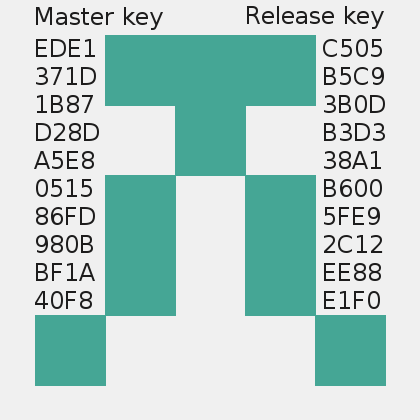data distribution geared toward scientific datasets
Project description
____ _ _ _
| _ \ __ _ | |_ __ _ | | __ _ __| |
| | | | / _` | | __| / _` | | | / _` | / _` |
| |_| | | (_| | | |_ | (_| | | |___ | (_| | | (_| |
|____/ \__,_| \__| \__,_| |_____| \__,_| \__,_|
Read me
Distribution
10000-ft. overview
DataLad makes data management and data distribution more accessible. To do that, it stands on the shoulders of Git and Git-annex to deliver a decentralized system for data exchange. This includes automated ingestion of data from online portals and exposing it in readily usable form as Git(-annex) repositories, so-called datasets. The actual data storage and permission management, however, remains with the original data providers.
The full documentation is available at http://docs.datalad.org and http://handbook.datalad.org provides a hands-on crash-course on DataLad.
Extensions
A number of extensions are available that provide additional functionality for DataLad. Extensions are separate packages that are to be installed in addition to DataLad. In order to install DataLad customized for a particular domain, one can simply install an extension directly, and DataLad itself will be automatically installed with it. An annotated list of extensions is available in the DataLad handbook.
Support
The documentation for this project is found here: http://docs.datalad.org
All bugs, concerns, and enhancement requests for this software can be submitted here: https://github.com/datalad/datalad/issues
If you have a problem or would like to ask a question about how to use DataLad,
please submit a question to
NeuroStars.org
with a datalad tag. NeuroStars.org is a platform similar to StackOverflow
but dedicated to neuroinformatics.
All previous DataLad questions are available here: http://neurostars.org/tags/datalad/
Installation
Debian-based systems
On Debian-based systems, we recommend enabling NeuroDebian, via which we provide recent releases of DataLad. Once enabled, just do:
apt-get install datalad
Gentoo-based systems
On Gentoo-based systems (i.e. all systems whose package manager can parse ebuilds as per the Package Manager Specification), we recommend enabling the ::science overlay, via which we provide recent releases of DataLad. Once enabled, just run:
emerge datalad
Other Linux'es via conda
conda install -c conda-forge datalad
will install the most recently released version, and release candidates are available via
conda install -c conda-forge/label/rc datalad
Other Linux'es, macOS via pip
Before you install this package, please make sure that you install a recent
version of git-annex. Afterwards,
install the latest version of datalad from
PyPI. It is recommended to use
a dedicated virtualenv:
# Create and enter a new virtual environment (optional)
virtualenv --python=python3 ~/env/datalad
. ~/env/datalad/bin/activate
# Install from PyPI
pip install datalad
By default, installation via pip installs the core functionality of DataLad,
allowing for managing datasets etc. Additional installation schemes
are available, so you can request enhanced installation via
pip install datalad[SCHEME], where SCHEME could be:
teststo also install dependencies used by DataLad's battery of unit testsfullto install all dependencies.
More details on installation and initial configuration can be found in the DataLad Handbook: Installation.
License
MIT/Expat
Contributing
See CONTRIBUTING.md if you are interested in internals or contributing to the project.
Acknowledgements
The DataLad project received support through the following grants:
-
US-German collaboration in computational neuroscience (CRCNS) project "DataGit: converging catalogues, warehouses, and deployment logistics into a federated 'data distribution'" (Halchenko/Hanke), co-funded by the US National Science Foundation (NSF 1429999) and the German Federal Ministry of Education and Research (BMBF 01GQ1411).
-
CRCNS US-German Data Sharing "DataLad - a decentralized system for integrated discovery, management, and publication of digital objects of science" (Halchenko/Pestilli/Hanke), co-funded by the US National Science Foundation (NSF 1912266) and the German Federal Ministry of Education and Research (BMBF 01GQ1905).
-
Helmholtz Research Center Jülich, FDM challenge 2022
-
German federal state of Saxony-Anhalt and the European Regional Development Fund (ERDF), Project: Center for Behavioral Brain Sciences, Imaging Platform
-
ReproNim project (NIH 1P41EB019936-01A1).
-
Deutsche Forschungsgemeinschaft (DFG, German Research Foundation) under grant SFB 1451 (431549029, INF project)
-
European Union’s Horizon 2020 research and innovation programme under grant agreements:
Mac mini instance for development is provided by MacStadium.
Contributors ✨
Thanks goes to these wonderful people (emoji key):
Project details
Release history Release notifications | RSS feed
Download files
Download the file for your platform. If you're not sure which to choose, learn more about installing packages.
Source Distribution
Built Distribution
File details
Details for the file datalad-0.19.5.tar.gz.
File metadata
- Download URL: datalad-0.19.5.tar.gz
- Upload date:
- Size: 1.4 MB
- Tags: Source
- Uploaded using Trusted Publishing? No
- Uploaded via: twine/4.0.2 CPython/3.12.1
File hashes
| Algorithm | Hash digest | |
|---|---|---|
| SHA256 | 639cdd5ede96f614933e017f65ddb01f17637ab7bf700005ea0ac7835cc2b905 |
|
| MD5 | 6d78f09222b4778e46b8d83aa62f7593 |
|
| BLAKE2b-256 | 495bacf4c60ffae666db155ad567022269208794f4a9b2bb91dc9e4d1488e61b |
Provenance
File details
Details for the file datalad-0.19.5-py3-none-any.whl.
File metadata
- Download URL: datalad-0.19.5-py3-none-any.whl
- Upload date:
- Size: 1.3 MB
- Tags: Python 3
- Uploaded using Trusted Publishing? No
- Uploaded via: twine/4.0.2 CPython/3.12.1
File hashes
| Algorithm | Hash digest | |
|---|---|---|
| SHA256 | 16b5b948e76b9ec4ef78da78deb57d0f2ff6f510561c73d61fd3c573bbaff5ea |
|
| MD5 | 8c8df9638f6298a7e91ad1b442350d28 |
|
| BLAKE2b-256 | 5c29597828ab89ae808d73e4b948c272276751f336375f5953a02c55e2a11c46 |

























































































